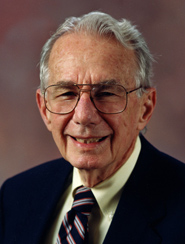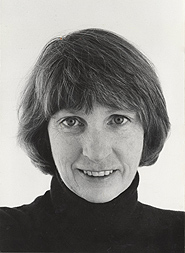Berkeleyan
Awards
![]()
03 May 2006
Bush honors Arthur Rosenfeld with Fermi Award for his work in physics and energy efficiency
Arthur Rosenfeld, professor emeritus of physics and a California energy commissioner, was named winner of the Enrico Fermi Award on April 27 by President Bush, the U.S. Department of Energy (DOE) has announced.
 Arthur Rosenfeld |
The Fermi award, the government's oldest award for scientific achievement, comes with an honorarium of $375,000 and a gold medal. Administered by DOE on behalf of the White House, the award is named for the late Nobel laureate Enrico Fermi, leader of the group of scientists who, on Dec. 2, 1942, achieved the first self-sustained, controlled nuclear reaction. Rosenfeld, formerly a staff scientist at DOE's Lawrence Berkeley National Laboratory (LBNL), was Fermi's last graduate student at the University of Chicago. He will accept the award at a ceremony in Washington, D.C., on a date to be announced.
The award came on the eve of a daylong symposium honoring Rosenfeld, who turns 80 on June 22, for his pioneering work in energy-efficient building design. "The Rosenfeld Effect," the April 28 symposium, drew scientists from across the country, including Joseph Romm, former Acting Assistant U.S. secretary of energy for energy efficiency and renewable energy. From 1994 to 1999, Rosenfeld was senior adviser to Romm.
Rosenfeld receives the Fermi award in recognition of a career of scientific discoveries in particle physics as well as pioneering innovations for the efficient use of energy. He has been a commissioner at the California Energy Commission since 2000, where he now serves as chairman of the Research and Development Committee and as the second member of the Energy Efficiency Committee.
Robert Birgeneau, Michael Hout, Daniel McFadden elected to APS
The American Philosophical Society (APS) has elected three Berkeley faculty to membership, it was announced on April 29. Chancellor Robert Birgeneau, a physicist, was among eight distinguished scholars elected from the fields of mathematical and physical sciences. And Michael Hout, professor of sociology, and Daniel McFadden, professor of economics (and a Nobel Prize-winner in that field), were among 10 scholars elected from the social sciences.
Other notables elected to the APS this year are John F. Nash Jr., a Nobel Prize-winning mathematician at Princeton whose life formed the basis of the movie A Beautiful Mind; Ben Bernanke, chairman of the Federal Reserve; Joan Didion, the writer (a 1956 Berkeley graduate); and Ruth Bader Ginsberg, associate justice of the U.S. Supreme Court.
The APS, founded in 1743 by Benjamin Franklin, has 943 elected members, 791 from the United States and 152 from more than two dozen foreign countries.
Charles Townes
The National Science Board has named Nobel laureate and Berkeley physicist Charles Townes, 90, to receive the Vannevar Bush Award for lifetime contributions to science and for longstanding statesmanship in science on behalf of the nation. The award, to be conferred on May 9 in Washington, D.C., is named after the former presidential science adviser who wrote a report (Science: The Endless Frontier) that steered U.S. policy toward support of basic research after World War II. Previous honorees include former UC President Richard Atkinson, in 2003, and former Berkeley Chancellor Glenn Seaborg, in 1988.
Honored with Townes this year is Raj Reddy, founding director of The Robotics Institute at Carnegie-Mellon University.
The National Science Board is the 24-member body of policy advisers to the President and Congress on matters of science and engineering research, and is the policymaking and oversight body for the National Science Foundation.
Margaretta Lovell
 Margaretta Lovell |
Margaretta Lovell, a professor of American art and architecture, is the recipient of a Smithsonian American Art Museum award that recognizes outstanding scholarship in American art. She is being honored with the 18th annual Charles C. Eldredge Prize for her book, Art in a Season of Revolution: Painters, Artisans and Patrons in Early America.
The Eldredge Prize awards $2,000 to the author of a recent book-length publication that provides new insight into works of art, an artist, or aspects of theory and history that add to the understanding of America's artistic heritage. The prize was established in 1989 in honor of Eldredge, who founded the American Art Forum in 1986, while he was director of the Smithsonian American Art Museum.
Lovell will present the annual Eldredge Prize lecture on April 7, 2007, at the Smithsonian American Art Museum in Washington, D.C

